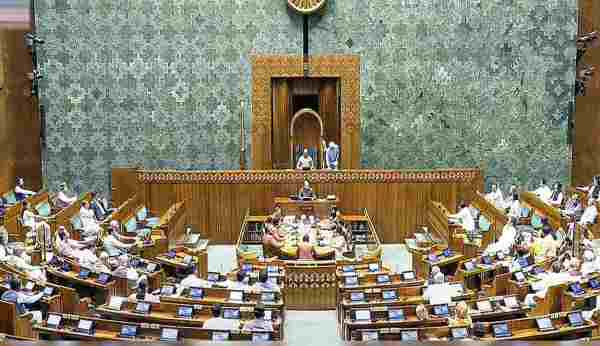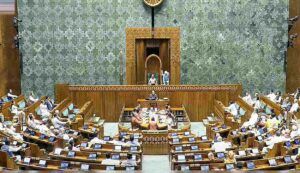
New Delhi: Following the approval of a resolution recognizing President’s Rule in Manipur and the passing of the Waqf Amendment Bill, the Lok Sabha adjourned at roughly 2.40 am on Thursday, after more than 13 hours. Now that there are just two days remaining in the Budget Session, the Rajya Sabha will take over.

But first, the Lok Sabha’s conclusion. With 288 votes in favor and 232 against, the Waqf Bill was approved after over 12 hours of heated discussion. The statutory motion on accepting the declaration of the President’s Rule in Manipur was brought up at approximately 2 am, startling the opposition, just as a relatively lengthy day in the Lower House seemed to be coming to an end. Following the resolution’s motion by Union Home Minister Amit Shah, Speaker Om Birla invited Congress MP Shashi Tharoor to speak. The Speaker was questioned, “Sir, do you genuinely want the discussion at this time?” by the Thiruvananthapuram lawmaker, who seemed surprised. In a little more than 30 minutes, the debate on the matter was over, and the resolution was approved. At a House Business Advisory Committee meeting last month, it was determined to set aside an hour for the consideration of the Manipur resolution.
One of the things to watch will be how the Opposition reacts to this late-night surge in the Lower House. The governing party has been blamed by the opposition for not ending the ethnic violence in Manipur, which started in May 2023. As it left a BAC meeting on Tuesday, it also accused the administration of “bulldozing” through its agenda and neglecting topics it wished to bring up.
The resolution on ratifying the President’s Rule in Manipur and the Waqf Bill, which are on Thursday’s Revised Business List, will next be discussed by the Upper House. With 125 MPs, including 98 from the BJP, four from the JD(U), three from the NCP, two from the TDP, and six nominated members, the BJP-led NDA is also well-positioned in the Rajya Sabha with regard to the Waqf Bill.
In contrast, the Opposition INDIA group has 88 Members of Parliament, including 13 from the Trinamool Congress and 27 from the Congress. The numbers won’t be sufficient, even if the seven MPs of the BJD, headed by Naveen Patnaik and who have shifted more and more toward the anti-BJP opposition, support the INDIA group.
Determining how to formulate its political rhetoric moving forward would be a problem for the opposition, particularly with the crucial Bihar elections approaching in a few months. Legal challenges are anticipated, so this won’t be the last time we hear about the Waqf Amendment Bill. According to Hyderabad’s Asaduddin Owaisi, the head of AIMIM, the bill’s goal is to “humiliate Muslims and make Muslims second-class citizens.” The All India Muslim Personal Law Board has already said that it would oppose the “black law” nationally and contest the Bill in court.
One of the most important considerations in the days ahead will be what approach the INDIA bloc takes
On April 22, 2024, the Supreme Court is expected to rule on petitions challenging the Calcutta High Court’s ruling that invalidated the appointment of 25,753 teachers and other staff members in West Bengal’s state-run and state-aided schools.